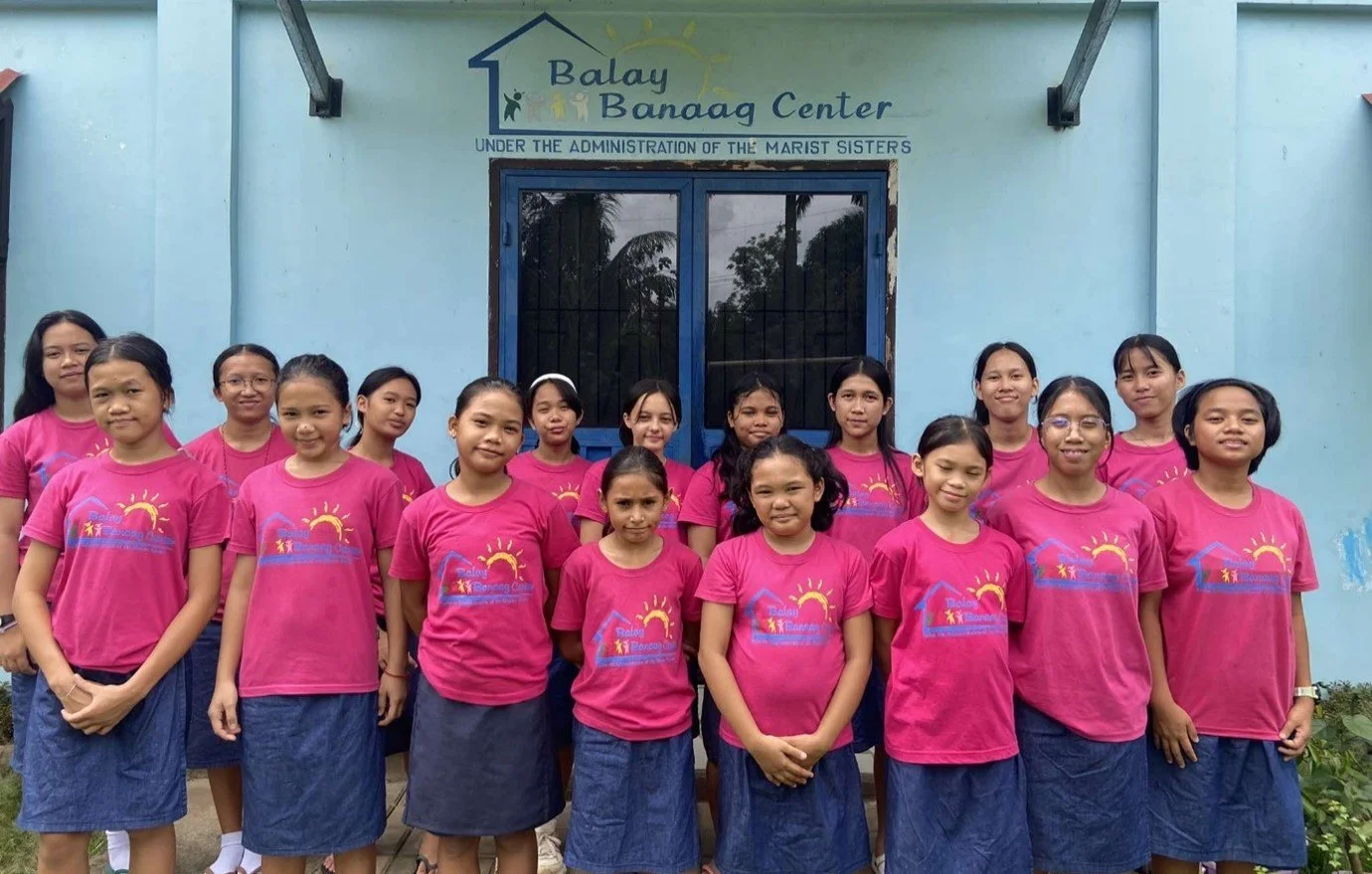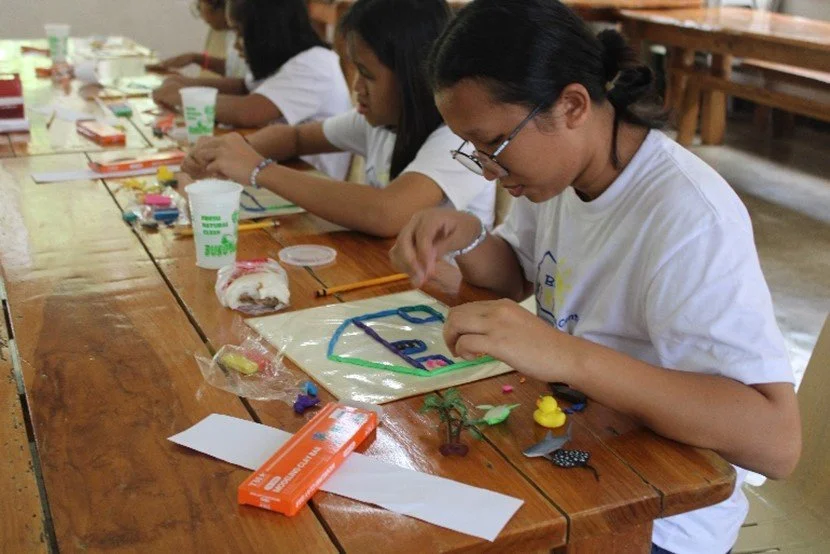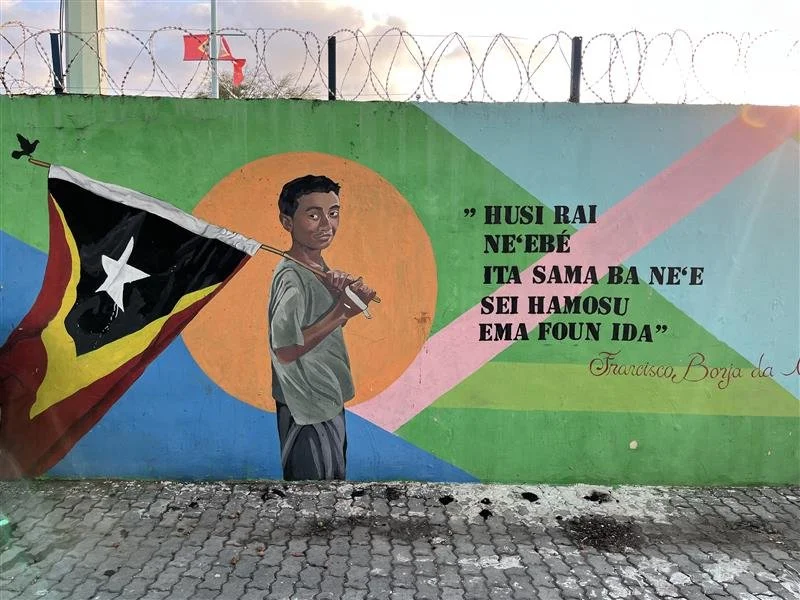International Day of the Girl Child: A Reflection by Taylor Lemmon, AMS International Programs Officer.
In honour of International Day of the Girl Child, AMS sat down with our very own Taylor Lemmon, who works closely with our program partners across Asia. In this personal reflection, Taylor shares insights from her two years at AMS, highlighting both the ongoing need for greater equality for young girls and, more importantly, the extraordinary commitment of our program partners. Guided by the vision of St. Marcellin Champagnat, they stand on the front lines, providing education and care to those who would otherwise go without.
Q. Can you tell us about the work AMS does to support girls in the communities we serve?
At AMS, we place a strong emphasis on equity in education and on creating opportunities for girls and women who often face compounding barriers to education and meaningful employment. We work alongside our partners to ensure that gender equity is embedded across all our programs and to foster stronger collaboration in breaking down the historical and systemic disadvantages that many girls in the region experience. Our goal is to ensure that every girl has an equal opportunity to thrive in her own right and on her own terms.
Q. Why is it important to put extra emphasis when it comes to helping girls, rather than children in general?
While AMS’s programs support all children, it is vital to place specific focus on girls because they continue to face unique and compounding barriers to education, safety, and opportunity. Across the region, girls are more likely to be kept out of school to help with domestic work, face early marriage or exploitation, and are less likely to access formal employment later in life.
By investing in girls, we are not only addressing these inequities but also creating a ripple effect of benefits. When a girl is educated and supported, she is more likely to secure meaningful work, contribute economically, and advocate for the wellbeing of her family and community. Research consistently shows that empowering girls leads to healthier families, stronger communities, and more sustainable development outcomes.

Young girls at Balay Banaag, outside the centre entrance- Philippines

Girls at Balay Banaag, ready for their school trip!
Q. How do issues such as access to education affect their futures?
When girls are denied education, their opportunities for meaningful employment, financial independence, and decision-making power are severely limited.
This is evident across multiple programs AMS supports, with a key example being Balay Banaag in the Philippines. The centre supports the daughters of women in sex work by providing a safe, residential environment along with access to education, psychosocial care, and consistent support so they can thrive. These children face heightened risks of neglect, abuse, stigma, and exploitation, and research shows that lack of schooling and emotional support significantly increases their vulnerability to being drawn into sex work themselves. Without targeted interventions, many are at risk of dropping out of school, experiencing trauma, and remaining trapped in cycles of poverty and exploitation.
Education not only opens pathways to work but builds confidence, resilience, and leadership skills that allow girls to break cycles of poverty and contribute to stronger, more inclusive communities.
Q. Have you noticed changes in attitudes toward girls’ rights and opportunities over the years, whilst being at AMS?
Honestly, it can sometimes feel difficult to see broad shifts in attitudes when there is still so much work to be done to address the intersecting challenges girls and young women face in fully realising their rights and accessing equal opportunities. That said, I have witnessed many encouraging changes, both small and significant. Sometimes, change is as simple as seeing equal numbers of boys and girls in a classroom, or schools adjusting their timetables so that girls are not walking home in the dark. It can also be seen in the confidence of a girl who, after completing her exams, chooses to pursue higher education - knowing that she has both the right and the ability to make that choice.
One example that has stayed with me comes from the Anti-Human Trafficking Sewing Project in Myanmar (pictured right), which equips young women with sewing and business skills, enabling them to support themselves and their families.
When reading comments from the participants, a common thread emerges: they speak of how the project has changed their lives, giving them the strength and confidence to face challenges and the patience and resilience to grow. Many report feeling more connected to others, more at peace in their daily lives, and more hopeful for the future. A recurring theme is their desire to no longer depend on their families, but instead to stand on their own feet, earn an income, and make their families proud. For them, the project has provided not only practical skills but also meaning, dignity, and the understanding that women can empower one another to move forward together.
For me, these are the real markers of progress, when girls and young women are increasingly able to see themselves as capable, independent, and valued, and when communities begin to recognise and support those opportunities.
“Sometimes, change is as simple as seeing equal numbers of boys and girls in a classroom, or schools adjusting their timetables so that girls are not walking home in the dark.
It can also be seen in the confidence of a girl who, after completing her exams, chooses to pursue higher education - knowing that she has both the right and the ability to make that choice.”

Nutrition is important! Students receiving care in the way of meals, ensuring they are fed and energised for their learning.

Play-Therapy: Students take to the arts as a way to connect with themselves and their creative side.
Q. What are the biggest challenges that girls face in the communities you work with?
This is a difficult question because girls face compounding challenges that contribute to their vulnerability and limit their development. However, in my opinion, one of the biggest barriers is deeply embedded gender norms, which restrict equal access to education and opportunity. These norms are reflected in practices such as early marriage, the expectation that girls prioritise domestic duties, and the preference for boys to attend school as future providers, while girls are expected to serve the family. Until these cultural expectations shift, and the value of educating girls is fully recognised, cycles of disadvantage and exploitation will continue.
Q. Can you share a story of a girl whose life has been transformed through your programs?
One story that stays with me is of a young girl from Davao City who entered the Balay Banaag Centre at age ten. She came from a difficult environment, marked by instability and limited access to education. When she first arrived, she was bright but carried the weight of hardship - often acting out and struggling to trust others.
Through the care and consistency of the Balay Banaag team, she began to flourish. She discovered her talent for singing, developed respect and empathy for others, and grew in confidence. With stable access to food, shelter, and education, her academic performance improved dramatically, and she graduated at the top of her class.
After several years, she was successfully reintegrated with her mother, who now supports her continued schooling. Before leaving, she shared her dream of becoming a lawyer to help protect children’s rights - a powerful reflection of her growth and the hope that education and care can bring to young girls lives.

Holy Communion of student from Balay Banaag

Students posting with their graduation certificates

Fruit, fresh from the garden!

Tomatoes, fresh from the garden!

Play therapy: Student pose with her artwork

Students are taught to tender to gardens- all produce is then used for their meals whilst under the care of the centre

Weeding and planting

Cooking up a storm during cooking class

Play Therapy- team building and learning to trust one another
Q. How does empowering girls impact their families and communities as a whole?
When a girl is empowered, the ripple effect is extremely noticeable. Educated girls become advocates for their siblings, role models for their peers, and contributors to stronger families. Communities benefit through improved health, higher income, and greater social cohesion. Empowering one girl can shift community attitudes - creating spaces where women’s voices are valued, and where equality begins to take root for the next generation.
Q. What role can governments and policy changes play in supporting girls?
Governments play a critical role in creating the conditions for girls to thrive. Policy changes that prioritise access to quality, inclusive education, safeguard children from exploitation and early marriage, and address gender-based violence are essential. Investment in social protection, safe transport, and affordable education removes many of the barriers that keep girls out of school. Governments must also partner with local organisations to ensure policies translate into practical, community-based action. When governments push themselves for gender equity not only in law but in implementation, they help build systems that protect, empower, and enable girls to reach their full potential.
Q. While at AMS, what have you seen throughout your career so far that has reaffirmed that, as an organisation, it is moving in the right direction when it comes to inclusive education for women?
What continually reaffirms to me that AMS is moving in the right direction is seeing the tangible impact of inclusive education across our partner programs. Whether it’s girls in the Philippines confidently returning to school after years of vulnerability or young women in Myanmar gaining independence through skills training, the change is visible. AMS has embedded gender equity, safeguarding, and inclusion into every stage of programming. The shift from viewing education as access alone to understanding it as empowerment -where every child, especially girls, can learn with dignity -shows real and lasting progress.
If you or someone you know would like to support our programs, please consider making a donation. Every dollar goes towards programs like Balay Banaag, which are supporting young people across Asia and the Pacific have access to education.
Together, we bring hope.



